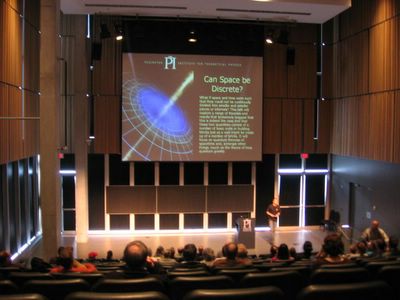Can space be discrete?
This weekend I had another dilemma, to choose between discovering Hamilton City's heritage or to find out if space can be discrete.
Since the city of Hamilton is not so close to the Kitchener-Waterloo area as Elmira, I could not compromise as I did last month. Even though I'm eager to learn about Ontario's heritage, this month subject of PI Black Hole Sessions was quite intriguing.
Mathematics tells us that real space is continuous i.e. it can be divided forever. Some of the physical world theories come though to contradict this.
Tomasz Konopka (PhD student at UW and PI) started the session with some examples of the difference between discreteness and continuity.
In the first example a bicycle wheel could behave in a discrete or continuous mode depending of its state. In an experiment when a ping-pong ball is thrown towards the bicycle we could think of the wheel as being discrete, if it is stationary. Assuming that the distance between spokes is large enough the ball will go through the wheel most of the times. Now if we spin the wheel all of the empty spaces will be "filled" (because the spokes are moving) and the ball will bounce off the wheel. The spinning wheel is an example of continuous space model.
The next example of discrete/continuous comparisons was about the nature of color. The spectrum of natural colors in a rainbow is continuous while any digitized color is discrete.
Currency exchange is another example of the difference between discrete and continuous. In real life we use a discrete number of coins and bills but when we do currency exchange a continuous function is used. To get the discrete amount in the new currency the rounding operation is used.
The last example given was about the water's nature. We all think of water as continuous but when we go at the molecular level we realize that it consists of discrete molecules. It is this discreteness that gives its interesting properties.
After all these examples Tomasz defined what are the research issues of the discrete space.
Then he presented three theories about space discreteness: discrete analysis and the Plank Scale, triangulation models and loop quantum gravity. The triangulation approach produces interesting Universe models that support the Big Bang theory.
The Spin networks use in space modeling yields a surprising result about the discrete properties of space.
It looks like that sometimes the nature can be described in discrete terms.

Since the city of Hamilton is not so close to the Kitchener-Waterloo area as Elmira, I could not compromise as I did last month. Even though I'm eager to learn about Ontario's heritage, this month subject of PI Black Hole Sessions was quite intriguing.
Mathematics tells us that real space is continuous i.e. it can be divided forever. Some of the physical world theories come though to contradict this.
Tomasz Konopka (PhD student at UW and PI) started the session with some examples of the difference between discreteness and continuity.
In the first example a bicycle wheel could behave in a discrete or continuous mode depending of its state. In an experiment when a ping-pong ball is thrown towards the bicycle we could think of the wheel as being discrete, if it is stationary. Assuming that the distance between spokes is large enough the ball will go through the wheel most of the times. Now if we spin the wheel all of the empty spaces will be "filled" (because the spokes are moving) and the ball will bounce off the wheel. The spinning wheel is an example of continuous space model.
The next example of discrete/continuous comparisons was about the nature of color. The spectrum of natural colors in a rainbow is continuous while any digitized color is discrete.
Currency exchange is another example of the difference between discrete and continuous. In real life we use a discrete number of coins and bills but when we do currency exchange a continuous function is used. To get the discrete amount in the new currency the rounding operation is used.
The last example given was about the water's nature. We all think of water as continuous but when we go at the molecular level we realize that it consists of discrete molecules. It is this discreteness that gives its interesting properties.
After all these examples Tomasz defined what are the research issues of the discrete space.
Then he presented three theories about space discreteness: discrete analysis and the Plank Scale, triangulation models and loop quantum gravity. The triangulation approach produces interesting Universe models that support the Big Bang theory.
The Spin networks use in space modeling yields a surprising result about the discrete properties of space.
It looks like that sometimes the nature can be described in discrete terms.



0 Comments:
Post a Comment
<< Home